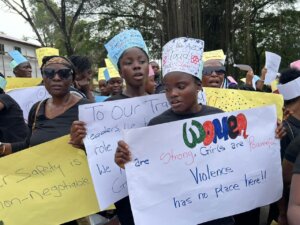Globally, there is a regression in the progress of women’s rights protection, increased rates of domestic violence, and amplified poverty in women.
Pregnancy and childbirth, compounded by gender inequalities, expose women and adolescent girls, especially, to sexual and reproductive health risks.
A 2019 report by the World Health Organization showed that maternal health conditions such as haemorrhage, sepsis, or obstructed labour were the second leading cause of death among girls aged 15-19.
According to the same source, in Sub-Saharan Africa, the region with the highest adolescent birth, 1 out of 10 adolescent girls aged 15-19 give birth and only 1 in 4 adolescent girls have their needs for family planning satisfied by modern methods.
When it comes to making decisions about their own sexual and reproductive health, less than 50% of married adolescent girls make informed decisions regarding sexual relations, contraceptive use and reproductive health. In Nigeria, Mali and Senegal, 1 in 10 or fewer adolescent girls do.














